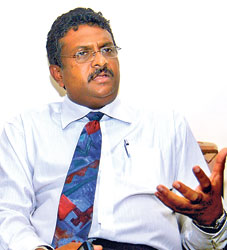The university system is in a precarious position, and could well collapse, if the academic staff at the universities vacated their posts in protest at the government’s failure to give them a salary increase.
Professor Sampath Ameratunge, president of the Federation of University Teachers’ Associations (FUTA), told the Sunday Times that the academic community is dissatisfied with the current pay structure. The maximum salary for a senior academic is Rs. 59,755, and that of a probationary lecturer Rs. 20,750.
“All department heads will quit their posts if no solution is found by August 16,” said Prof. Ameratunge, who is also dean of the Management Faculty, the University of Sri Jayawardenepura. University staff take turns volunteering for the post of department head, a job that carries much responsibility.
 |
| Professor Sampath Ameratunge, president. Federation of University Teachers’ Associations |
“If they do quit, it would affect the entire study programme. The exam timetable will be disrupted, lectures will be held up, and the students will suffer from a lack of supervision.”
The Federation of University Teachers’ Associations held a token strike this week, and the University Grants Commission (UGC) issued a circular saying that all those who took part in the strike would have a day’s wage deducted from their salary.
“We are a trade union, without political influence,” Prof. Ameratunge said. “We have genuine grievances. We have made several representations to the government but nothing has been done. We had discussions with President Mahinda Rajapaksa in 2008. and again in 2009.
We also met Minister Basil Rajapaksa, the National Salaries and Cadres Commission, and the present Higher Education Minister, S. B. Dissanayake. Despite all the discussions, our salaries have not changed since 2006.”
According to Professor Ameratunge, there are some 4,000 tertiary institution academic staff, including 310 professors, in the country. Every year, 50 to 60 academics leave to take up lecturer posts at tertiary institutions overseas. Some of them have between 20 to 25 years’ teaching experience.
“The trend for highly qualified teachers leaving for countries like the United Kingdom, the United States and Canada, is on the increase, and this is especially the case with Ph.D holders, who get a salary here of about Rs. 55,000 rupees.”
According to Prof. Ameratunge, all the universities have a number of vacated positions for lecturers in the engineering, medical, dental and management faculties.
A new salary structure has been presented to Parliament for the next budget. The proposed monthly salary for lecturers and professors is set at an upper limit of Rs. 200,000 and a lower limit of Rs. 72,000. However, by the time the new salary structure is approved and comes into effect, a number of academics would already have left the country, Prof. Ameratunge pointed out.
Dr. Mahim Mendis, president of the Open University Teachers’ Association, told the Sunday Times that a number of Sri Lankan academics with doctoral qualifications obtained overseas have returned to serve the country, but are disappointed at the poor prospects here and thinking of going back and obtaining permanent residency in other countries.
“The academic community should not be taken for granted,” Dr. Mendis said. “The government keeps making empty promises to the academic community. This has become almost routine. We were told there would be an interim solution, with a 25 to 50 per cent increase in the allowance, and that this would be given in December 2009. But there has been no such increase.”
Dr. Mendis, a senior lecturer in Social Studies with 23 years’ teaching experience, said the government should issue a circular to make the proposed salary increase legal.
Meanwhile, student groups say they support their lecturers, but hope they will not abandon the students by leaving the country.
A spokesman for the Inter-University Students Federation said top-scorers in the medical, dental and engineering faculties would rather work for private companies or go overseas than work as lecturers at a Sri Lankan university.
“Most first-class degree holders do not remain in the country,” he said. “This is especially so at the Rajarata, Uva and Wayamba universities.”
The Sunday Times contacted University Grants Commission chairman Professor Gamini Samaranayake, who refused to comment.
The Minister of Higher Education, S. B. Dissanayake, told the Sunday Times that the salary increase could be granted only from the next budget, and there would be no interim salary arrangement for university lecturers. He said the Ministry would be negotiating with the universities on this matter. |


